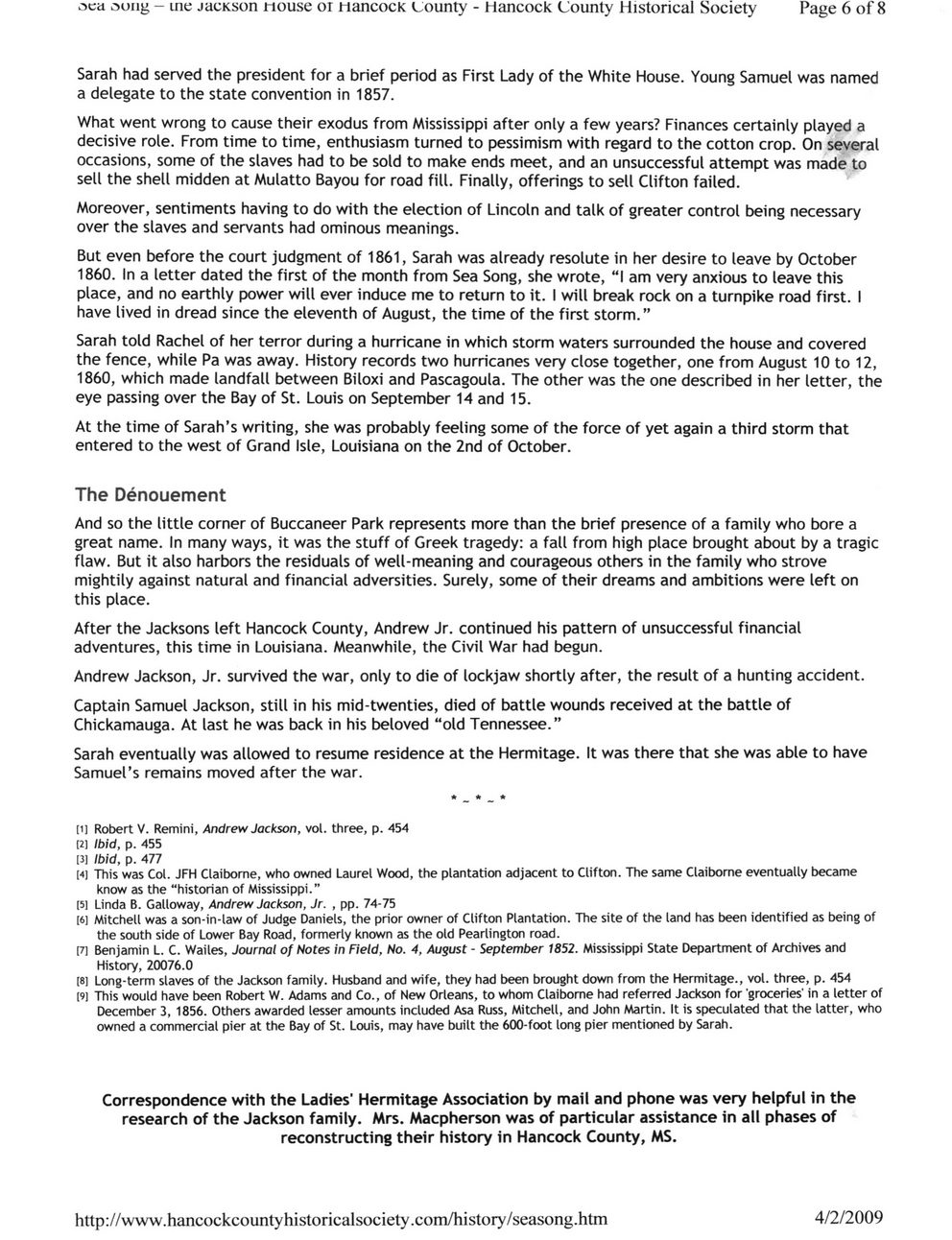This text was obtained via automated optical character recognition.
It has not been edited and may therefore contain several errors.
oca aong - me jacKson Mouse or Hancock county - Hancock County Historical Society Page 6 of 8 Sarah had served the president for a brief period as First Lady of the White House. Young Samuel was named a delegate to the state convention in 1857. What went wrong to cause their exodus from Mississippi after only a few years? Finances certainly played a decisive role. From time to time, enthusiasm turned to pessimism with regard to the cotton crop. On several occasions, some of the slaves had to be sold to make ends meet, and an unsuccessful attempt was made to sell the shell midden at Mulatto Bayou for road fill. Finally, offerings to sell Clifton failed. Moreover, sentiments having to do with the election of Lincoln and talk of greater control being necessary over the slaves and servants had ominous meanings. But even before the court judgment of 1861, Sarah was already resolute in her desire to leave by October 1860. In a letter dated the first of the month from Sea Song, she wrote, ?I am very anxious to leave this place, and no earthly power will ever induce me to return to it. I will break rock on a turnpike road first. I have lived in dread since the eleventh of August, the time of the first storm.? Sarah told Rachel of her terror during a hurricane in which storm waters surrounded the house and covered the fence, while Pa was away. History records two hurricanes very close together, one from August 10 to 12, 1860, which made landfall between Biloxi and Pascagoula. The other was the one described in her letter, the eye passing over the Bay of St. Louis on September 14 and 15. At the time of Sarah?s writing, she was probably feeling some of the force of yet again a third storm that entered to the west of Grand Isle, Louisiana on the 2nd of October. The Denouement And so the little corner of Buccaneer Park represents more than the brief presence of a family who bore a great name. In many ways, it was the stuff of Greek tragedy: a fall from high place brought about by a tragic flaw. But it also harbors the residuals of well-meaning and courageous others in the family who strove mightily against natural and financial adversities. Surely, some of their dreams and ambitions were left on this place. After the Jacksons left Hancock County, Andrew Jr. continued his pattern of unsuccessful financial adventures, this time in Louisiana. Meanwhile, the Civil War had begun. Andrew Jackson, Jr. survived the war, only to die of lockjaw shortly after, the result of a hunting accident. Captain Samuel Jackson, still in his mid-twenties, died of battle wounds received at the battle of Chickamauga. At last he was back in his beloved ?old Tennessee.? Sarah eventually was allowed to resume residence at the Hermitage. It was there that she was able to have Samuel?s remains moved after the war. * * * [11 Robert V. Remini, Andrew Jackson, vol. three, p. 454 [2] Ibid, p. 455 [3] Ibid, p. 477 [4] This was Col. JFH Claiborne, who owned Laurel Wood, the plantation adjacent to Clifton. The same Claiborne eventually became know as the ?historian of Mississippi.? [5] Linda B. Galloway, Andrew Jackson, Jr. , pp. 74-75 [6] Mitchell was a son-in-law of Judge Daniels, the prior owner of Clifton Plantation. The site of the land has been identified as being of the south side of Lower Bay Road, formerly known as the old Pearlington road. [7] Benjamin L. C. Wailes, Journal of Notes in Field, No. 4, August - September 1852. Mississippi State Department of Archives and History, 20076.0 [8] Long-term slaves of the Jackson family. Husband and wife, they had been brought down from the Hermitage., vol. three, p. 454 [9] This would have been Robert W. Adams and Co., of New Orleans, to whom Claiborne had referred Jackson for groceries' in a letter of December 3, 1856. Others awarded lesser amounts included Asa Russ, Mitchell, and John Martin. It is speculated that the latter, who owned a commercial pier at the Bay of St. Louis, may have built the 600-foot long pier mentioned by Sarah. Correspondence with the Ladies' Hermitage Association by mail and phone was very helpful in the research of the Jackson family. Mrs. Macpherson was of particular assistance in all phases of reconstructing their history in Hancock County, MS. http://www.hancockcountyhistoricalsociety.com/history/seasong.htm 4/2/2009

Bookter Alexander-020